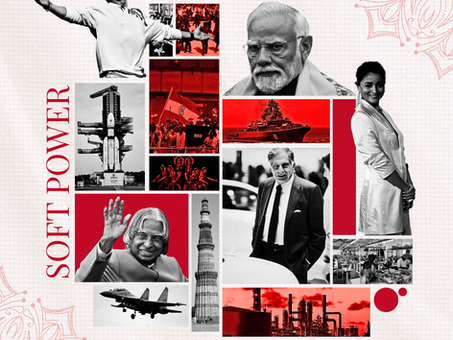top of page
Home: Welcome
Search


Geopolitics and Green Shipping: How Global Instability is Slowing Maritime
Global shipping, which constitutes the backbone of international trade and carries nearly 90% of world trade, now remains one of the most challenging sectors to decarbonise. As climate change intensifies, the maritime sector faces pressure to reduce its carbon footprint. Illustration by The Geostrata An international framework led by the International Maritime Organisation (IMO) has laid out pathways towards Global shipping, which constitutes the backbone of international t

THE GEOSTRATA
Jan 293 min read


Union Budget 2026–27: Fiscal Priorities, Tax Choices and India’s Economic Strategy
For the record 9th time , the Finance Minister Nirmala Sitharaman prepares to present the Union Budget for 2026-27 on 1st February 2026. This exercise has more significance than a routine fiscal update. As India emerges as one of the world’s fastest-growing economies , it faces a blend of domestic challenges, opportunities and global risks. Illustration by The Geostrata Slowing global demand, trade fragmentation, U.S. tariff pressures and weakening investor sentiments call fo

THE GEOSTRATA
Jan 286 min read


Bangladesh at the Crossroads: Indian Perspective on Stability, Strategy, and the Neighbourhood
For India, Bangladesh has never been just another neighbour. Geography would have made that impossible, but history sealed it. The two countries share memories of 1971, which still shape political instincts on both sides, and there are dense economic and social ties; this means that developments in Bangladesh are seldom distant events for New Delhi. Illustration by The Geostrata They are experienced, discussed, and in many cases privately fretted about. For most of the last d

THE GEOSTRATA
Jan 275 min read


Bridging Continents, Binding Laws: Inside the India-Morocco MLAT
In a world that is increasingly interdependent, with crime and commercial disputes occurring across jurisdictions, international cooperation with respect to the legal and judicial aspects of these disputes is critical. Illustration by The Geostrata On July 31, 2025, India and Morocco, two nations with a long diplomatic relationship, took the next steps toward furthering international cooperation by issuing a Mutual Legal Assistance Treaty (MLAT) and a related Memorandum of

THE GEOSTRATA
Jan 265 min read


The India-EU Trade Pact: A Strategic and Urgent Imperative
As the first month of 2026 comes to a close, the global economic establishment is less a coherent system and more a fragmented mirror of competing interests. With the EU – India summit less than a week away, the atmosphere is charged with unprecedented urgency. As the EU President Ursula von der Leyen touches down in India alongside other European leaders for Republic Day celebrations on January 26, the long-anticipated India – EU trade deal stands on the precipice of finaliz

THE GEOSTRATA
Jan 256 min read


India-EU Sustainable Cooperation: From Dialogue to Action - A Report
The relations between India and the European Union (EU) have evolved. In recent years, the two sides have extended through successive climate cooperation initiatives to develop collaborations in energy efficiency, climate mitigation, renewable energy, transport systems and beyond. Cover by The Geostrata Since the inception of the Clean Energy and Climate Partnership (CECP) in 2016 and the announcement of the EU’s ‘India Strategy’, the two sides, in response to improving the

THE GEOSTRATA
Jan 242 min read


India-ASEAN Cooperation Connect: Pathways for Building Stronger Regional Integration in South Asia
In today’s world of rapidly shifting alliances and contested borders, regions that succeed are not the ones that rely only on geography or shared history, but those investing in building meaningful linkages among their people, economies, and institutions. Perhaps, Southeast Asia offers the most compelling examples. Despite its cultural diversity and political differences, ASEAN has managed to turn its neighbourhood into a community bound by trust and interdependence.

THE GEOSTRATA
Jan 236 min read


The Architect of India's Global Identity: How Jawaharlal Nehru Gave India a Voice Before It Had Power
He spoke the language of poetry, but he thought in the grammar of geopolitics. Jawaharlal Nehru was not only the political architect of independent India; he was also the architect of its identity in the world. When he took over as leader in 1947, India was a battered, partitioned country, impoverished from colonial exploitation and unsure about its future. Illustration by The Geostrata But Nehru envisioned something more significant than survival; he imagined an India that c

THE GEOSTRATA
Jan 226 min read


When Power Performs: How Performances Shaped Revolution and Public Consciousness
Power is rarely exercised in isolation; it goes beyond laws and policies and into the realm of persuasion and perception. Authority ultimately remains in the hands of the leader and their ability to evoke, persuade and mobilise collective imagination. Illustration by The Geostrata Long before the advent of social media, politics unfolded on streets and marketplaces where the audience was not just passive observers but active members in shaping a narrative and leading to a rev

THE GEOSTRATA
Jan 218 min read


India's Forgotten Tongues: The Anatomy of Language Decline
Languages are disappearing around the world at an unprecedented pace. UNESCO’s Atlas of the World’s Languages in Danger (2023) estimates that a language dies roughly every two weeks, a quiet death that erases an entire way of viewing and understanding the world. Each time a language dies, we lose more than just the words; we lose a cultural universe of myths, songs, humour, and history. Illustration by The Geostrata In India, a country with what is usually described as lin

THE GEOSTRATA
Jan 206 min read


Reassessing the Gujral Doctrine: Normative Ideals vs Strategic Realities
South Asia is characterized by a geopolitically volatile environment within contemporary global power dynamics. Once viewed as an arena where India’s influence was unquestionable, it is now marked by political uncertainty, regime shifts, never-ending hostilities, security tensions, and competitiveness, along with external influence, particularly China. Collectively, these developments have changed the landscape of South Asia into a contested domain rather than a collaborative

THE GEOSTRATA
Jan 195 min read


The Misal of Maharashtra Politics: Mumbai, Mahanagar & Mess - Up
“When the state whose Babasaheb Ambedkar gave India its constitution, stumbles, it's truly a time to do political course correction.” The election season of the year is back in full swing, and this time the boiling pot is Maharashtra. The state with the highest urbanisation index is currently undergoing the process of electing all its urban local bodies in the form of municipalities and municipal corporations. Illustration by The Geostrata It is these elections that matter fo

THE GEOSTRATA
Jan 187 min read


From Rhetoric to Architecture: Institutionalising Narratives in India-ASEAN Relations
The India-ASEAN narrative has evolved from a position of optimism in 2017 as the dialogue partnership turned 25, to a narrative of resurgence in 2022, and finally, the narrative of strategic repositioning and imperative reclamation as of today. What started as an executionary mechanism to India’s Look East Policy has now given rise to a regional partnership that has withstood geopolitical tremors and a systemic dismantling of the global order.

THE GEOSTRATA
Jan 175 min read


NATO-India Relations: Advancing Joint Actions Through Complementarity and Dialogue
NATO-India relations have evolved significantly into a global defence and political importance. In an ever-evolving global trend marked by realignment and cataclysmic effects of globalisation, the participatory framework of partnerships with non-member states from different geographical regions shapes the democratic and security interests of nations beyond the transatlantic community. Cover by The Geostrata The relations between NATO and India go back to the events of ‘9/11’,

THE GEOSTRATA
Jan 162 min read


ISRO's Strategic Ascent: Competitive Positioning in the Global Heavy Launch Market
The Indian Space Research Organisation (ISRO) has swiftly broken into the global hierarchy of space launch providers, proving itself as a formidable competitor in the heavy launch vehicle market. While SpaceX is widely recognised for its reusable technology and the European Space Agency known for its cemented historical prestige, ISRO has established itself as a “reliable cost-efficient leader” for medium-to-heavy-lift missions. Illustration by The Geostrata By combining comp

THE GEOSTRATA
Jan 155 min read


India’s Soft Power Deficit: Why India Must Take Charge of Its Global Story
Western media, movies, and think tanks continue to dominate the global narrative of India, which frequently focuses on issues such as poverty, overcrowding, gender issues, religious tensions, and politics. Although these challenges are real, India's achievements in innovation, development, and global ambitions. This limited view reduces India to a collection of problems rather than seeing it as a developing nation influencing the future. Illustration by The Geostrata Even wor

THE GEOSTRATA
Jan 146 min read


Age of Development: Comparative Analysis of Development Between Jammu and Kashmir and POJK - A Report
The partition of the Indian subcontinent in 1947 did not merely divide territory but set in motion a prolonged geopolitical contest over the princely state of Jammu and Kashmir. Cover by The Geostrata Although the Instrument of Accession legally integrated Jammu and Kashmir into the Indian Union but Pakistan’s invasion and continued occupation of parts of the erstwhile state gave rise to what are now referred to as Pakistan-Occupied Kashmir (PoK) and Gilgit-Baltistan, and s

THE GEOSTRATA
Jan 132 min read


Governing In Permanent Emergency: Why Crisis Has Become The New Normal
The international system was built on the implicit assumption of normalcy for many years. Stable times were thought to be the default state of world affairs, interspersed with sporadic crises that upset the status quo but were eventually resolved, such as wars, economic downturns, and pandemics. Institutions, models of governance, and diplomatic expectations were all influenced by this worldview. That presumption is no longer valid today. Illustration by The Geostrata Instead

THE GEOSTRATA
Jan 125 min read


Rewriting India’s Labour Landscape: A Structural Reset of Work, Wages, and Worker Rights
The structure of labour laws in India for the past seven decades was not only filled with a web of bureaucracy and complex, sometimes overlapping, rules, but also incompatible with the vision of the new industrial and innovative India. Illustration by The Geostrata This reality was embraced by the Government of India and the Ministry of Labour and Employment when Union Minister Mansukh Mandaviya introduced four new bills to the parliament, which replaced the web of the previo

THE GEOSTRATA
Jan 118 min read


The SHANTI Bill: Modernising India’s Nuclear Energy Architecture
India’s nuclear trajectory is marked by scientific ambitions, technological self-reliance and isolation from international politics. The nuclear sector was mainly governed by the Atomic Energy Act, 1962, which was a highly centralised and state controlled framework, prioritising safety and sovereignty. Later legislations, like Civil Liability for Nuclear Damage Act, 2010 addressed accountability and victim compensation for nuclear incidents.

THE GEOSTRATA
Jan 105 min read
CONTACT
NEW DELHI
9797066235
bottom of page
.png)



